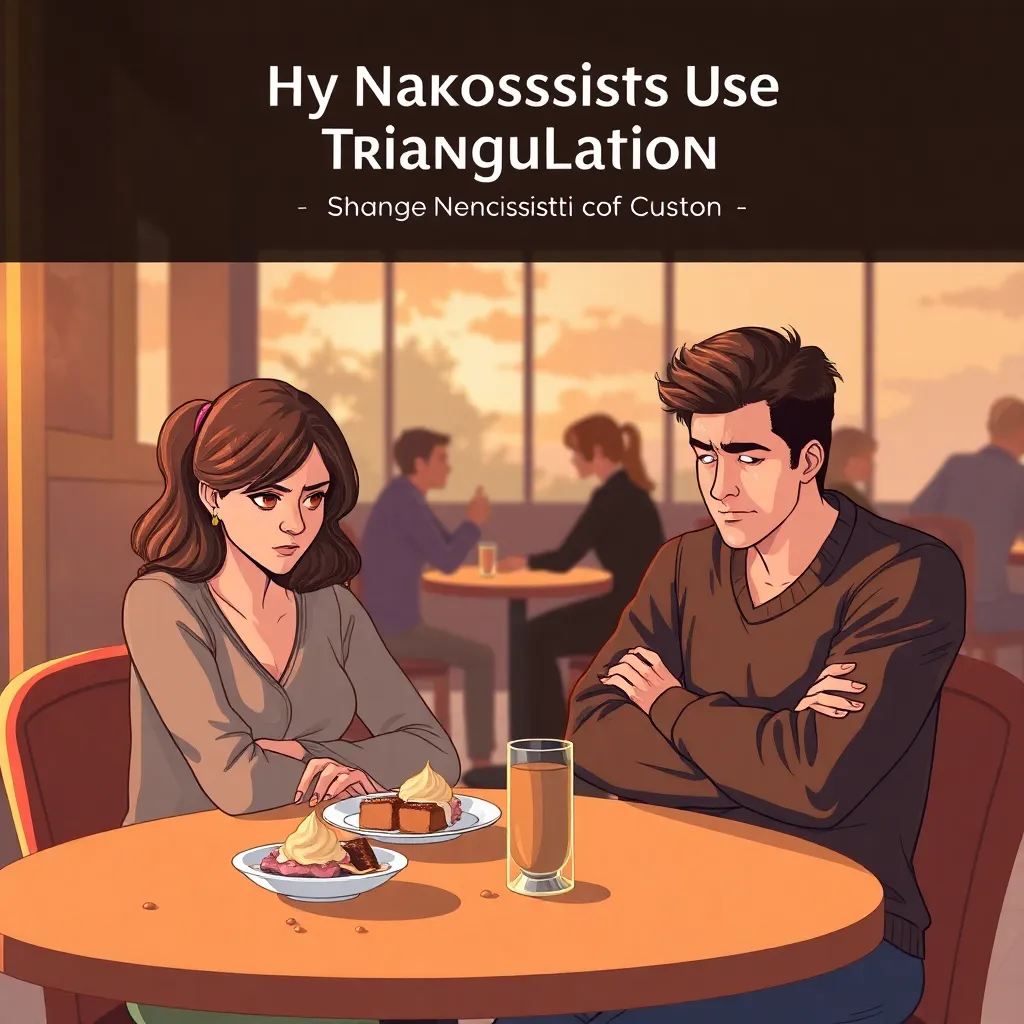Navigating a relationship with a narcissist can often feel like walking through a maze filled with confusion and self-doubt. For those who find themselves entangled in this complex dynamic, the concept of “triangulation” might be an all-too-familiar tactic that leaves you questioning your reality. It’s essential to recognize that you are not alone in experiencing these unsettling emotions—many others have walked this path and have sought understanding and clarity.
Understanding why narcissists use triangulation can be a vital step in reclaiming your sense of self and agency. This manipulation technique involves drawing a third party into your relationship, often to create jealousy or competition, and can leave you feeling isolated and insecure. By learning about the signs and motivations behind triangulation, you empower yourself with the knowledge needed to protect your emotional well-being.
In this article, we will explore the mechanics of triangulation and delve into the reasons narcissists employ this strategy. You will gain insights into how this behavior manifests and the psychological underpinnings that drive it. Our aim is to provide you with practical guidance and emotional support as you navigate these challenging interactions, helping you to build healthier boundaries and restore balance in your relationships.
1. Defining Narcissistic Triangulation

Narcissistic triangulation is a subtle yet powerful tactic used by individuals with narcissistic tendencies to exert control over those around them. It involves introducing a third party into the dynamics of a relationship to create a sense of competition or jealousy, effectively destabilizing the original bond.
Consider a scenario where a partner frequently compares their significant other to an ex, subtly implying that the ex was more attractive or successful. This can leave the current partner feeling insecure and seeking validation, which is exactly what the narcissist desires, as it places them in a position of increased power.
The main goal of triangulation is to keep the focus on the narcissist, ensuring that all interactions revolve around their perceived needs and desires. By creating tension or rivalry among those involved, the narcissist can manipulate emotions and maintain control over the relationship dynamics.
Experts suggest that recognizing triangulation can be the first step towards breaking free from its harmful effects. Understanding this behavior allows individuals to set boundaries and protect their emotional well-being, fostering healthier relationship dynamics.
2. Motivations Behind Triangulation Tactics

Narcissists often engage in triangulation to maintain a sense of *control* and *power* in their relationships. By introducing a third person into a dynamic, they can manipulate perceptions and pit people against each other, reinforcing their own *superiority*.
Another motivation behind triangulation is to keep their partners in a state of *uncertainty* and *insecurity*. This tactic ensures that the narcissist remains the central figure, where attention and affection must constantly be earned, creating a cycle of dependence.
In some cases, narcissists use triangulation to bolster their own *self-esteem*. By creating competition among those around them, they receive a steady supply of *validation* and *admiration*, which fuels their fragile ego.
Triangulation can also serve as a way for narcissists to avoid *direct confrontation*. By involving a third party, they can deflect blame and maintain an image of innocence, preserving their self-image. Understanding these motivations can help individuals recognize and address these behaviors in their relationships, leading to healthier interactions.
3. Triangulation’s Impact on Victims

The insidious nature of triangulation can have profound effects on the emotional well-being of the victim. Often, individuals find themselves trapped in a cycle of self-doubt and confusion, questioning the reality of their own experiences. This emotional turmoil can manifest in various aspects of their lives, affecting both personal and professional relationships. For instance, someone might second-guess their abilities at work, fearing judgment and comparison to others.
Furthermore, being subjected to triangulation often leads to isolation. Victims may withdraw from friends and family, feeling that no one truly understands their situation. This withdrawal is sometimes reinforced by the manipulator, who subtly suggests that others are also part of the problem. Consequently, the victim’s support network becomes weakened, making it even harder to break free from the manipulative relationship.
In terms of emotional health, the constant emotional manipulation can lead to anxiety and even depression. The victim is left in a state of chronic stress, always wary of the next conflict or comparison. It’s crucial to recognize these signs early and reach out for professional help if necessary. Engaging with a therapist can provide the tools to rebuild one’s self-esteem and regain control.
It’s important to remember that feeling vulnerable in such situations is normal, and seeking help is a sign of strength, not weakness. By understanding and addressing the impact of triangulation, victims can begin to rebuild their lives with healthier boundaries and relationships.
4. Recognizing Triangulation in Relationships

Recognizing triangulation in relationships can be a pivotal step towards emotional well-being. Look for signs such as the narcissist frequently bringing a third party into conversations to validate their point of view. This third party might be a mutual friend or even an imagined figure whose opinions are used to manipulate the dynamics of the relationship.
In real-world scenarios, you might notice a partner who constantly compares you to an ex or a friend, subtly hinting at your perceived shortcomings. This tactic serves to keep you feeling insecure and off-balance, causing you to seek validation from the very person orchestrating the chaos. Over time, these comparisons create a cycle of doubt, making it difficult to trust your own perceptions.
Experts suggest that one way to counteract triangulation is by setting clear boundaries and refusing to engage in conversations that involve unnecessary third parties. If a partner begins to triangulate, gently steer the conversation back to the immediate issue at hand. By doing so, you not only protect your emotional health but also send a clear message that manipulative tactics won’t be tolerated.
Another effective strategy is to strengthen your support network outside the relationship. Confide in trusted friends or family members who can offer a grounded perspective and remind you of your worth outside the narcissist’s influence. This external support acts as a buffer, helping you reclaim your confidence and reinforcing the reality of your experiences.
Ultimately, recognizing triangulation empowers you to make informed decisions about your relationship. By understanding these dynamics, you can choose paths that prioritize your emotional well-being and foster healthier interactions. Remember, awareness is the first step toward creating positive change in your life.
5. Strategies to Counteract Triangulation

Understanding how to effectively counteract triangulation can be a pivotal step in safeguarding your emotional well-being. To start, it is crucial to establish and maintain strong boundaries with the narcissist, clearly communicating what behavior is unacceptable.
For instance, if you notice a pattern of being pitted against a friend or colleague, address the issue directly with the person involved. By opening a direct line of communication, you can often dispel misunderstandings and prevent the narcissist from driving a wedge between you.
Another effective strategy is to build a reliable support network of friends or family who can provide perspective and validation. Sharing your experiences with trusted individuals can help counteract the isolation often imposed by triangulation tactics.
Moreover, practicing self-awareness can empower you to recognize when you’re being pulled into a triangulated dynamic. Reflect regularly on your interactions and emotions, which can help you stay grounded and prevent manipulation from taking root.
Finally, consider seeking professional guidance from a therapist who understands narcissistic behaviors. An expert can offer valuable insights and coping mechanisms, ensuring you have the tools to navigate these challenging interactions effectively.
By implementing these strategies, you can reclaim your emotional autonomy and foster healthier relationships. Remember, the key is to remain vigilant and proactive in safeguarding your connections from negative influences.
Conclusion: Creating Beautiful Outdoor Spaces
In exploring why narcissists use triangulation, we’ve delved into five key relationship concepts: the manipulative dynamics of triangulation, the psychological impact on the victim, the illusion of competition it fosters, the erosion of trust it causes, and the importance of setting boundaries to protect oneself. Understanding these concepts is the first step toward empowerment and healing.
As an actionable next step, take a moment today to evaluate any relationships where you feel manipulated or pitted against others. Reflect on how you can establish healthy boundaries, whether through open communication or seeking support from a trusted friend or professional.
Remember, knowledge is power. Bookmark or save this article so you can revisit these insights whenever needed, ensuring you have a handy guide to navigate complex relationship dynamics.
Looking ahead, envision a future where your relationships are based on mutual respect and understanding, free from manipulation. By equipping yourself with this knowledge and taking proactive steps, you are paving the way for healthier, more fulfilling connections. Embrace the journey of learning and growth, and let each step bring you closer to the relationship success you deserve.
